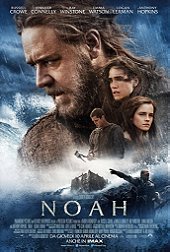Before seeing Noah on the big screen, initial expectations were a mixed bag. Aronofsky’s auteurist style through glowing visual spectacle and his own psychological visions of life would make Noah stand out. However, because we had yet to see a spectacular Biblical adaptation of Noah’s Ark and that Aronofsky made minor adjustments to develop his own interpretation, the faithfulness to the original tale had been uncertain. This is primarily due to Hollywood centralising spectacle vision these days above plot concepts and character development. Still, it is an Aronofsky film and the majority of his work had become successful. Noah took a different turn from any other Noah adaptation, if not any Biblical film, than we have seen in a long time as it focuses more about the consequences of evil among humanity, which we can understand in real life, and expresses an important message - the world that was created isn’t a bad place, it’s the people in it.
Aronofsky has always been a creative auteur in bridging a characters’ vision of their fantasies through imagination and reality, whether psychologically in Black Swan and Requiem For A Dream or visually in The Fountain. The Genesis tale of Noah and his Ark is vital to Aronofsky’s auteurist style as the story illustrates on a visual scale, the history of mankind and formation of the Earth, whilst also focusing on the consequences of mankind and psychological viewpoint of Noah. Details leading to the events are told in a prologue in a unique animation, similar to Harry Potter And The Deathly Hallows: Part I. The fact it was done in this style allows viewers to imagine those occurrences, such as Adam and Eve as well as Cain and Abel, for themselves. The animation also recreates history, at least according to the Bible, and makes it appear more supernatural, representing a significance of Heaven and Hell. Aronofsky also applied a superb stop-motion sequence depicting the history of the universe and evolution of life which could possible serve as historical theories regarding Earth’s formation. He also uses multiple landscape shots of Earth to signify it as pre-historical and examine the naturalistic beauty of the world, though damaged by mankind. Nevertheless, Aronofsky has always been an artistic director and his work on Noah would perhaps be his most innovative, visually, and deserves critical acclaim for yet another triumph.
Once again, we are witnessing Russell Crowe in another historical drama playing a leading figure. From Maximus and Robin Hood and now to Noah, Crowe delivers a performance that is extraordinary that bridges heroism and psychoanalysis. Very much like how Aronofsky had co-written the script, Crowe expressed Noah as a far more analytical character than he had been before and reveals the previously overlooked concepts of human conscience. Crowe is evidently a superior leading, powerful star in historical films that emphasise on human drama and thankfully, his performance as Noah could be about as faithful to the Bible. Jennifer Connelly portrays his wife Naameh, who may be an underdeveloped character but is simply represented as the mother of the family. Emma Watson’s career just got even better with another mature performance as Ila who, to a certain extent, becomes as important to the film as Noah himself as the film progresses. With more analysis, it could be possible that it’s secretly Watson’s film more than Crowe’s. Meanwhile, Ray Winstone has been overshadowed throughout his films these days but his role as Tubal-cain is possibly one of his biggest roles to date. It may not have been entirely relevant, but similar to half of his name, he reflected the evil of mankind at the time which became essential for the flood. Logan Lerman, who ironically starred with Watson in The Perks Of Being A Wallflower, makes a surprisingly good appearance in the film as Noah’s second son Ham and Anthony Hopkins, who seems to play the oldest character in high-budget productions these days, added further sophistication into the film as Noah’s grandfather Methuselah.
Aronofsky takes an interesting turn with Noah as he focuses less on satisfying religious folk with Biblical contents with its main emphasis being on human drama, psychoanalysis of the human mind and the consequences of evil. Aronofsky utilises his own unique visionary style as an auteur and applies human drama to this Genesis tale better than any other previous adaptation. Thus, Noah is a beautifully filmed, well-performed and uniquely written success which deserves its place among Aronofsky’s best films to date and that he could be a strong candidate to adapt another Biblical tale in the future.
9/10
 Login
Login